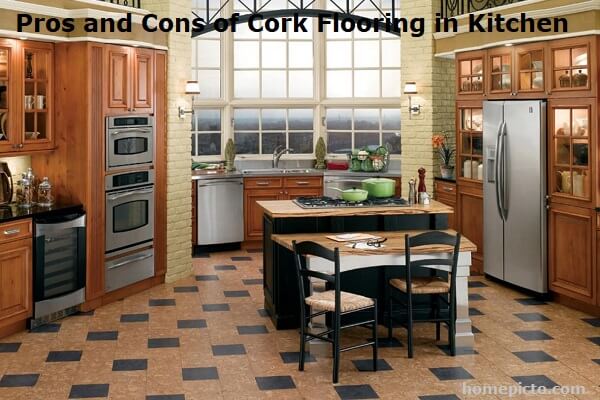Cork flooring has been popular for decades, but it has recently gone viral because it is a "green" renewable resource that may be utilized without guilt and contributes no pollution. Cork is a smart, environmentally responsible flooring option for many of today's homeowners. Is it the right option for you? Find out the Pros and Cons of Cork Flooring in Kitchen.
Cork flooring is made of the bark of cork oak trees. After stripping, the bark is ground into smaller pieces and layered to form the cork flooring planks. It's less dense than hardwood so that it can be walked on and acts as a noise and heat insulator.
Cork flooring is not as hard as hardwood and can be walked on, but it insulates and provides a soft feel underfoot. It also happens to be durable and natural.
There are many reasons why cork flooring is an excellent option for your kitchen. There are several Pros of cork flooring in kitchen; it's durable and easy to clean, takes less time on installation and cleaning. Your kitchen can stay all spick and span throughout the year. Here are some of the benefits to consider.
Cork flooring is a snap to install, and it's available in both floating and glued down varieties. When using the latter method, you'll need a concrete subfloor for a firm hold.
With cork flooring, you can select from a wide array of color options that will enhance the design appeal of your kitchen. The planks come in multiple colors and textures so you can create a custom look to fit with your existing décor.
Cork flooring occurs naturally, so it's classified as an environmentally friendly option. Cork oak forests serve as refuges for wildlife, while the bark is harvested with minimal impact on the trees.
Cork can reduce sound. Aside from having a snappy pop to its name, cork flooring provides good insulation against hot and cold temperatures. Lightweight planks are easy to install but durable enough to last for years of years.
If your home is an allergy sufferer's nightmare, cork flooring may be a viable option for you. Cork doesn't contain the harmful elements found in many other home products like formaldehyde and sealers that emit volatile organic compounds (VOCs).
The cons of cork flooring in kitchen include costs and chemicals use. You may have to pay more costs significantly more than vinyl or linoleum, so it might be more than what some people can pay. But if you have the budget for it, the problems are temporary.
Once damaged, cork flooring can be extremely difficult to repair once damaged, so it's essential to carefully install your kitchen flooring. If one plank becomes loose or falls out entirely, you'll have a tough time repairing the damage.
It takes some elbow grease to get cork floors installed in your home. It's the more involved option, but many homeowners are willing to take on this extra work because of cork flooring's benefits.
When floating (not glued down), you'll need to use a transition strip that will connect the planks and cover any gaps between them. This can be an eyesore in your kitchen and may need to be removed and replaced if the flooring is damaged.
Some varieties of cork flooring can give off a musty odor when they're installed, but this will dissipate over time. Your cork floors will smell like wood for about six months or so, but eventually, they will lose their new-cork smell.
Like most other types of flooring, Cork floors can cause skin rashes and allergies in susceptible individuals. Call a doctor immediately if you or your family members experience skin irritation that remains after the floors are installed and fully cured.
Conclusion on the Pros and Cons of Cork Flooring in Kitchen
Scratches, dents, or indentations can be sanded out of cork floors with relative ease. If the plank is severely damaged, you may need to replace it entirely rather than attempt to repair it.
Cork flooring in kitchens can add a great deal of warmth and character to your home. It's attractive, eco-friendly, and easy to install, but it can be challenging to repair if damaged. If you do decide to invest in cork flooring for your kitchen, heed to potential pros and mainly the cons.
